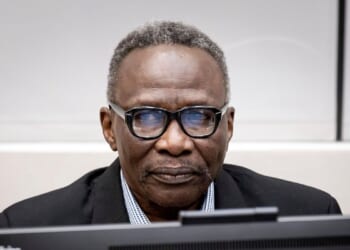The Following is a preview of Daily Signal Politics Editor Bradley Devlin’s interview with State Department Deputy Spokesman Tommy Pigott on “The Signal Sitdown.” The full interview premieres on The Daily Signal’s YouTube page at 6:30 a.m. eastern on Oct. 23.
While President Donald Trump did not receive the Nobel Peace Prize this year, he could be the odds on favorite to win the distinguished award in 2026 because of his work brokering peace deals or ceasefires in eight different conflicts this year.
Trump’s deal-making diplomacy comes as leftwing critics thought this level of success impossible because of Trump and Secretary of State Marco Rubio’s efforts to completely reform the State Department. The critics were wrong. State Department Deputy Spokesman Tommy Pigott joins “The Signal Sitdown” to provide an inside look at the department overhaul and how Trump has managed to find pathways to peace all over the world.
What Trump, Rubio, and the political appointees at the State Department like Pigott inherited from the Biden administration, in terms of both the geopolitical conditions and the internal conditions at the agency, was nothing short of disastrous.
”From a geopolitical context, I mean, we saw what happened under the previous administration, actions that, as President Trump has said, are some of the most embarrassing in our country’s history. Really terrible days from the Afghanistan withdrawal to the wars that broke out,” Pigott told The Daily Signal.
The Biden administration “had not prioritized the right things,” Pigott continued. “We’ve seen conflicts breaking out all over the world. We see a United States that’s no longer respected. That’s what we inherited.”
The Biden administration’s poor prioritization of America and its interests was painfully on display inside the agency that Trump and Rubio inherited.
Before the reorganization, the State Department was a bureaucratic nightmare, so much so that many careers who provided advice on the department’s restructuring emphasized the need to streamline the department’s processes. “The State Department has so many different offices that one office could be doing something in a country that the embassy has no idea about,” Pigott said. “And both of those entities could potentially be doing something that is contrary to the policy of the duly elected president of the United States.”
“For example, many of the aid programs that were in place could actually be doing things that are counter to the relationships we’re trying to build in many of these countries,” Pigott explained. “Sometimes the ambassador didn’t even know about the aid programs happening in the country where they were the ambassador.”
Things were so bad at the State Department, in fact, that Trump’s political appointees had a difficult time simply tracking down how many people actually worked there.
Meanwhile, policies that Pigott described as “woke” and “DEI” pervaded the its work. Between bureaucratic overhead and the woke policies, “in some of these programs, the previous administration was very happy to get this to 15 cents on the dollar in terms of reaching the end user,” Pigott claimed.
The goal for the State Department reorganization was to end the bureaucratic grift and “empower people,” Pigott told The Daily Signal.
“Let’s empower the embassies. Let’s actually make a structure that can implement the president’s policies,” Pigott said. “Part of this reform was empowering the regional bureaus because the regional bureaus and the embassies were the experts in these regions.”
“Of course we kept some of the functional bureaus that we needed,” Pigott added. “But the idea was empowering the regional bureaus because the people that are part of those regional bureaus know the countries the best.”
“We shouldn’t have functional activities that are counter to what the regional experts think we should be doing in each country,” Pigott said. “That’s oftentimes actually counterproductive.”
Meanwhile, the administration has racked up several major diplomatic wins in the form of peace agreements and ceasefires.
One of these successes was a ceasefire between India and Pakistan in May, when the two countries were entering an escalatory spiral over the long-standing Kashmir border dispute.
“You’ve heard leaders from across the world talk about the stakes that were involved, especially when you’re talking about two nuclear armed powers and the danger for miscommunication,” Pigott said about the India-Pakistan ceasefire.
“We saw members of this administration from the vice president, the president, the secretary across this administration, reaching out, having conversations at all times of the day to make sure that we’re communicating with the different countries here and really trying to find a way to keep this from escalating,” Pigott said of the administration’s efforts.
The biggest deal the Trump administration has managed to strike thus far is a 20-point peace plan in the war between Israel and Hamas. While the ceasefire continues to hold, challenges from both sides in the conflict make the path to lasting peace a long and narrow one—a reality this administration knows full well.
“No one is denying how hard this is or how complex this is,” Pigott said of implementing the peace deal. “As Jared Kushner said recently, [there are] 10 things we’re trying to do simultaneously in terms of implementing this peace plan.”
“But there is a chance here for long-term peace and prosperity for the people of Gaza, Israel, the entire region, because the entire region, the entire world, is behind this peace plan,” Pigott claimed.
“Our focus now is making it livable, making Gaza livable,” Pigott said of the next steps for the peace agreement. “Let’s be practical. Let’s be realistic. Let’s focus on the progress we can make today on the ground. Let’s focus on that.”
While many challenges remain, Pigott told The Daily Signal, “I think as Americans, we can be proud that we have a president who is a peacemaker.”











